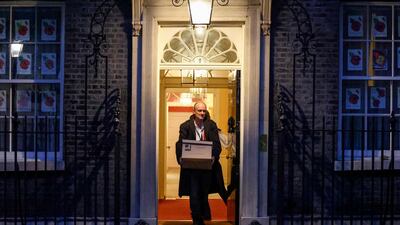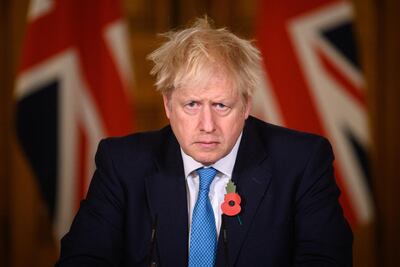British Prime Minister Boris Johnson’s top adviser has been seen leaving Downing Street carrying a moving box, amid reports that he has left his job following a bruising battle for influence fueled by tensions over Brexit and the coronavirus pandemic.
He had left for good rather than stay until the end of the year, the BBC reported.
The prime minister’s office hasn’t confirmed Dominic Cummings’ departure.
Earlier, Transport Secretary Grant Schapps insisted “advisers come and go” after Mr Cummings, one of the UK’s most influential political figures indicated that he plans to leave Downing Street by the end of the year.
Mr Cummings told the BBC his “position hasn’t changed since my January blog” when he wrote he wanted his role made “largely redundant” by the end of 2020.
He is the second special adviser to leave Number 10 in the space of a day after the prime minister’s communications director, Lee Cain, announced he was standing down on Wednesday.
But Mr Schapps dismissed suggestions the turmoil would affect the government’s decision-making.
He told Sky News: “(Mr Cummings) will be missed but then again we’re moving into a different phase - we have already left Europe and the transition period is coming to a close.
“Things move on, advisers come and go.
When asked if the chief aide’s departure would affect plans for mass coronavirus testing, which was planned by Mr Cummings, Mr Schapps said: “It is ministers who make decisions.”
Advisers are usually low-profile figures but Mr Cummings tended to court attention.
He was blamed for breaking the UK's unity over lockdown after travelling around 260 miles from London to Durham, despite experiencing coronavirus symptoms. He also famously said the drive to the town of Barnard Castle was to "test his eyesight".
The media and the public were furious over the alleged breach of lockdown restrictions but Mr Cummings stood firm, with the Prime Minister’s continued backing.
The resignation of two top advisers comes after 24 hours of political soap opera in which the pair were reportedly pitted against Carrie Symonds, Mr Johnson’s fiancee, and new Downing Street spokeswoman Allegra Stratton.
Internal tensions spilled into the open after Mr Cain was offered a promotion as the Prime Minister’s chief of staff.
Mr Cummings and Mr Cain are long-time colleagues, working together on the successful Vote Leave referendum campaign.
Mr Cummings, the mastermind behind the campaign, created the slogan ‘Take Back Control’ - three words that became synonymous with Britain’s decision to leave the European Union.
It was also the campaign that catapulted Mr Johnson into the national spotlight.
His departure will deprive the Prime Minister of his most important strategist, a man who has wielded huge influence over all aspects of government policy, from its pandemic response to Brexit and economic reform.
His resignation comes at a critical time for the UK: England is in the midst of a second national lockdown and Mr Johnson has just a few days left to finalise a Brexit trade deal with the EU before the deadline runs out.
It is unclear what Mr Cummings’ departure will mean for the UK’s post-Brexit transition arrangements.
However, his presence alongside Mr Johnson at the top of government has often been controversial.
Divisive figure
In the first turbulent months of Mr Johnson’s premiership during 2019, Mr Cummings waged a campaign against anti-Brexit sympathisers inside the governing Conservative Party, forcing some rebels out for good and ripping up political conventions.
The aide then helped steer the UK leader towards a historic election victory last December, winning the biggest Tory majority in more than 30 years on his platform to “level up” economically neglected regions of the country.
But when the pandemic hit at the start of the year, Mr Cummings’ project ran into a wall. All government focus was directed towards combating coronavirus and Mr Cummings himself inevitably became part of the story.
In May, Mr Johnson put his own authority on the line to defend his senior adviser, who was accused of breaking lockdown rules by driving to Durham when the public were being ordered to stay at home - he said he did so to seek help with childcare.
The PM was so determined to keep his chief aide that he appeared in public at press conferences and in Parliament to answer questions and repeatedly defend Mr Cummings’ actions.
Mr Schapps, meanwhile, said of Mr Cummings: "In any government you require people who are going to shake things up and come along with ideas, he's actually been that person."
However, reports of a domineering approach and regular clashes with colleagues are thought to have created a tense atmosphere within the government.
Bernard Jenkin, a Conservative party veteran and an MP since 2010, said Mr Cummings' departure could restore the "respect, integrity and trust" between Parliament and Downing Street, which have been "lacking in recent months".
"It's an opportunity to reset how the Government operates and to emphasise some values about what we want to project as a Conservative Party in government," Mr Jenkin said.
MP David Lammy, from the main opposition Labour party, said the departures of Mr Cain and Mr Cummings were "like rats fleeing a sinking ship".
"His (Cummings’) legacy is one of bullying, deception, hypocrisy and hubris," he added.

















